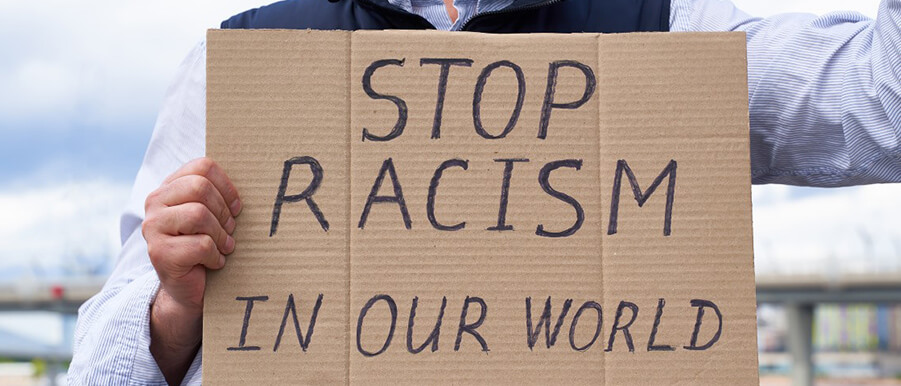 01 Jul 2020
01 Jul 2020
BY: admin
Counseling
Can Racial Trauma Cause PTSD?
Can Racial Trauma Cause PTSD?
Following the murder of George Floyd, America has been forced to address a long-standing history of racial injustice and discrimination. Many people have only just begun to listen, but the Black community has been speaking up for years. Now, they have a greater voice than ever, but with that attention comes an incredible amount of pressure. Emotional trauma from racial discrimination is finally being acknowledged, but where do you go to start healing?
Being Black in America is a stressful, anxiety-ridden experience on my fronts; parents fear for their children’s lives every day, and individuals experience shaming, ridicule and discrimination throughout life. Racial-based trauma can lead to a variety of mental health symptoms and conditions including depression, anxiety and post-traumatic stress disorder (PTSD).
What is Racial Trauma?
Black and POCI people have faced systemic injustices for centuries; cultural conditioning has resulted in hundreds of microaggressions that lead to chronic stress and anxiety. From fear of being pulled over and arrested unjustly or facing workplace discrimination or harassment, Black people have always been forced to live differently.
For LBGTQ+ and transgender Black people, the rate of discrimination and targeted attacks is even worse. In virtually every aspect of their life, ethnicity plays a factor in how they are treated, perceived and ultimately valued.
The result of this ongoing trauma includes physical and psychological effects, many of which share symptoms with PTSD. Hypervigilance, avoidance, anxiety attacks, flashbacks and nightmares are all common experiences that have been silenced for far too long.
At Caring Heart Counseling, we are committed to helping members of the Black community heal and grow from their experiences; we strive to use our own skills and platform as a voice for the underserved, and we want to not only help you overcome racial trauma but transform your pain into a powerful testament to the BLM movement.
How We Treat Racial Trauma
Social and cultural context are two of the most important aspects of addressing racial trauma. Even if you do not meet the diagnostic criteria for PTSD, your experiences are real, valid and deserve to be acknowledged for exactly what they are. We are here for you, and we want to help you find strength in your story.
Education is the cornerstone of our own treatment; we know that we have to learn and continue to amplify Black voices to become more understanding and empathetic therapists. Our entire team is committed to continually providing expert therapy and counseling to members of the Black community.
Together, we can work through this historic movement while resolving pain from the past and building hope for the future. Together, we will stand with you now and in the future with unlimited support, compassion and guidance.
 05 Sep 2018
05 Sep 2018
BY: admin
Counselor Blog / Specialties
What Is EMDR Therapy?
What is EMDR?
Eye Movement Desensitization & Reprocessing Therapy, or EMDR Therapy, is a psychotherapy used to treat troubling symptoms, like anxiety, guilt, anger, depression, panic, sleep disturbance, and flashbacks that are a result of traumatic experiences.
When a disturbing event occurs, it can get locked in the brain with the original picture, sounds, thoughts, feelings, and body sensations. EMDR seems to stimulate the information and allows the brain to reprocess the experience. This may be similar to what happens during REM or dream sleep. The rapid eye movements can help to reprocess the traumatic material; Your brain does the healing and you are the one in control.
How does EMDR work?
EMDR therapy uses eye movements to help you unlock certain memories and reprocess it so that it is no longer a sensitive memory for you. You are often asked to rate the memory on a scale of 0-10, where 0 is neutral and 10 is extremely disturbing. At each session, you will continue to use this scale throughout the EMDR process as one way to assess your progress. This is because EMDR allows your brain to heal itself, meaning that the processing and healing can continue between sessions. You may be in a different place at the next session than you were at the close of the previous session. We continue to process the memory until it is no longer bothersome to you.
How long does EMDR therapy take?
This depends on several factors including the nature of the problem being treated, the client’s history, and the client’s ability to tolerate high levels of disturbance. In some cases, one EMDR treatment session is enough. Usually, it takes weeks to months of treatment. When EMDR therapy is used appropriately it can significantly shorten the overall length of time in therapy.
If you are having nightmares or flashbacks, or are having trouble getting a disturbing picture out of your head, EMDR therapy may be able to help. Give us a call at 303-429-5099 or email info@experientm5.sg-host.com to learn more about EMDR Therapy can be effective for you.

